Last Updated on February 24, 2024
To err is human, to forgive divine.
This is one of the famous maxims that, no matter how often repeated, has never lost its ability to inspire. But let’s face it; saying sorry (in words or in deed) has never been a walk in the park, especially if the recipient of this noble gesture is someone who doesn’t deserve it at all.
As we prepare to forgive, there’s always a dissenting voice within us, pulling us back with a million reasons why the other person should be the one extending forgiveness instead. So, how do we rise above the thoughts that only feed resentment within us?
The following best-selling publications may hold key answers to that question.
Best Books on Forgiveness and Letting Go
1. Don’t Feel Stuck! by Jaclyn Johnston
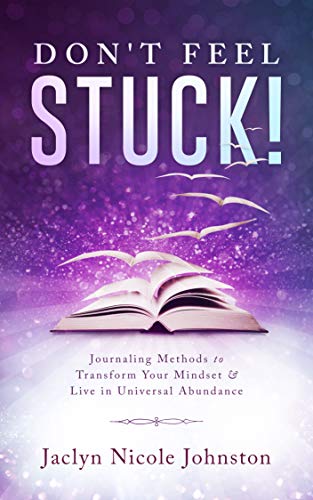
The title gives it all away. For us to truly manifest our life goals and achieve our true potential, we must put aside everything that impedes our progress.
As you may already know, the fears that are associated with forgiveness have a way of holding us back forever. These fears keep us reflecting more on the unwarranted injustice that was meted on us. We spend a great deal of our precious time thinking of how situations could have been if we hadn’t been offended in the first place.
Jaclyn Johnson, through her book Don’t Feel Stuck, observes that dwelling on the past is akin to denying your soul the happiness it so deserves. The book teaches about forgiveness yourself through releasing all the limiting thoughts and establishing a soul-empowering mindset-belief system.
2. The Book of Ho’oponopono by Luc Bodin
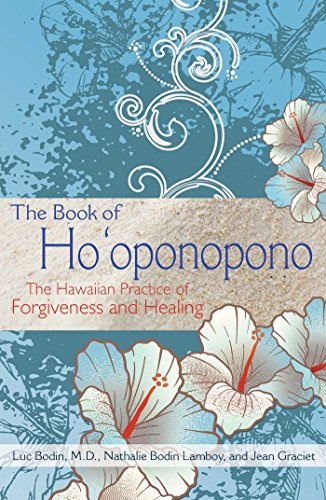
Forgiveness is the fastest step to making peace with ourselves and the world around us. That way, we can enjoy the peace and serenity that we otherwise couldn’t have due to the resentment that was festering within us.
In this book, Luc Bodin outlines all the nitty-gritty details about the Hawaiian concept of forgiveness and healing. Through the book, you’ll learn how to shed a heavy heart and welcome what’s essential for your progress as you let go of self-limiting thoughts.
The book is written as a step-by-step guide, enabling you to read as you put each step in practice.
3. Amish Grace: How Forgiveness Transcended Tragedy by Donald B. Kraybill, Steven M. Nolt, David L. Weaver-Zercher
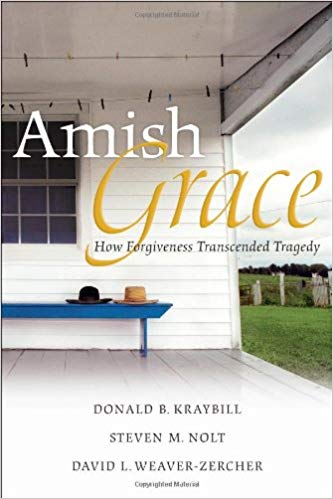
In the wake of the gruesome Pennsylvania Schoolhouse shooting, everyone expected the Amish to respond with equal or greater intensity. Well, everyone else except the Amish themselves.
While the world waited with bated breath to see the Amish explore all avenues to seek justice for the victims, it emerged that they had completely different plans on how to bring closure to the incident.
In this book, the co-authors examine the religious background of the Amish, and whether their ability to forgive so quickly had a grounding in their religious ideals.
The book strives to explore the relationship between forgiveness and the members within a cloistered society.
4. Free of Charge: Giving and Forgiving in a Culture Stripped of Grace by Miroslav Volf
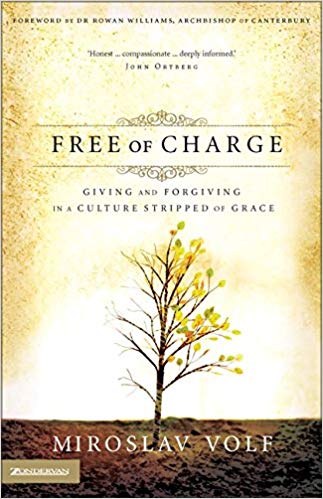
Giving and forgiving may rhyme in their pronunciations, but the two concepts hardly ever go hand in hand. When you’re reeling from the aftermath of injustice and your heart is troubled, the last thing you’d think of is showing kindness to anyone.
But the author of this publication, Miroslav Volf, introduces a rather interesting perspective to the whole art of forgiveness. Volf tries to examine the close ties between giving and forgiving, and how Christians can practice the two concepts in a society that’s naturally inclined towards hatred and selfishness.
The book explores forgiveness from a Christian point of view, while also introducing various other noble ideals of the Christian faith. You can get your copy and uncover why Free of Charge became the 2006 Lenten study book for the Archbishop of Canterbury.
5. Judgment Detox by Gabby Bernstein
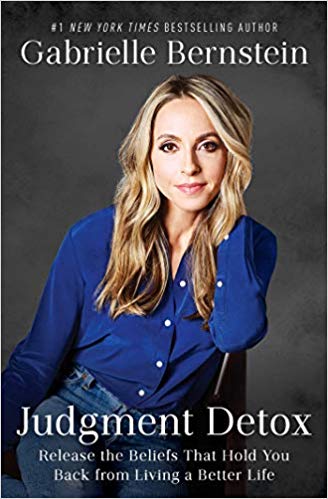
Judgment and forgiveness are usually intertwined. Indeed, how fast you rise above the habit of judging yourself and others determines how easily you forgive. Judgment Detox is a comprehensive guide that details how forgiveness can be achieved by dropping our judgmental persona.
The book explores self-forgiveness, an aspect of forgiveness that many people prefer not to talk about. Gabby Bernstein believes that to forgive others effectively, you must start by forgiving yourself. And that can only happen if you stop blaming yourself for your rather sorry state of affairs.
The book unravels the various ways self-judgment may prevent you from releasing your emotions. When those negative emotions keep building up within you, they’ll surely reach boiling point someday, causing you to react even more irrationally.
6. The Book of Forgiving: The Fourfold Path for Healing Ourselves and Our World by Desmond Tutu and Mpho Tutu
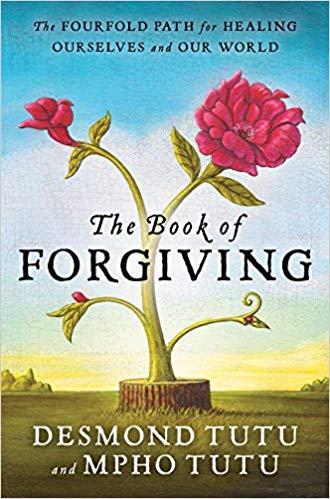
Archbishop Desmond Tutu has had an illustrious career as a peacemaker, with his most notable assignment being chairing South Africa’s Truth and Reconciliation Commission after the apartheid.
He has also served in numerous war-torn regions around the world, seeking to bring together the warring factions and encourage them to foster peaceful and harmonious coexistence.
In most of his missions, Desmond Tutu focused on the victims more than the aggressors. The archbishop believes that true peace can only be realized if the victims of atrocities let go of their anger and forgive their aggressors. The Book of Forgiving is an informative piece that Desmond Tutu co-authored, covering the four basic steps for healing and forgiving.
7. Forgiveness is a Choice: A Step-by-Step Process for Resolving Anger and Restoring Hope by Robert D. Enright
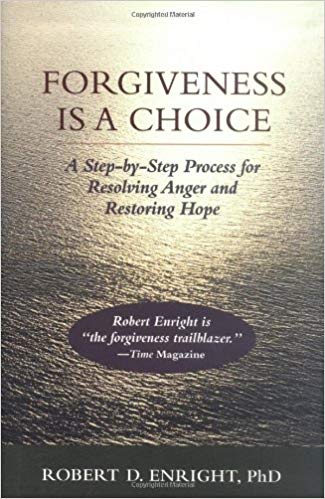
Forgiveness is a choice indeed, but one that we must make anyway. Forgiving others often feels like we’re ceding our pride and self-respect. That’s why we usually wait for months, maybe years, on end for the other party to own up to their mistakes before we can consider forgiving them.
Well, we can choose to live in that false sense of hope. Or, we can forgive as quickly as possible and rid ourselves of the heavy yoke of resentment.
Robert D. Enright, through the book, Forgiveness is a Choice, outlines numerous avenues that we can explore to overcome anger and depression after we’ve been severely hurt. The book is a how-to, list-style writing, which makes it easy to grasp the lessons therein.
8. Forgive and Forget: Healing the Hurts We Don’t Deserve by Lewis B. Smedes
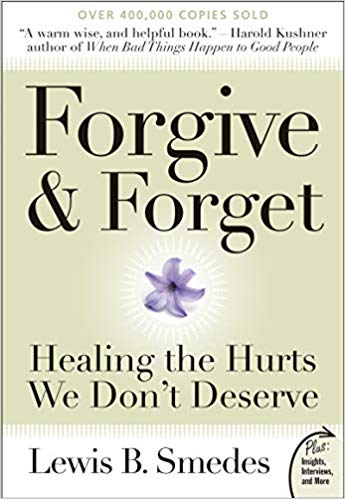
Forgiving is hard enough. Forgiving and forgetting is a lot harder.
We’ve heard it said from time immemorial that we should forgive and forget. But how do you forget a gruesome incident that keeps playing out in your mind during those still and quiet moments in your life? And isn’t it reasonable for us to forgive but don’t forget the names and places that remind us of that ugly incident?
Lewis B. Smedes argues that while it’s difficult to forgive and forget, it’s not entirely impossible. In this book, the author uses real-life accounts and illustrations to communicate how possible forgiveness can be. He examines how we can achieve total healing when we not only forgive but also forget those unfortunate chapters in our lives.
The book comes with bonus material and a reader’s guide to help you fully internalize the elusive concept of forgiveness.
9. Searching for God in the Garbage by Bracha Goetz
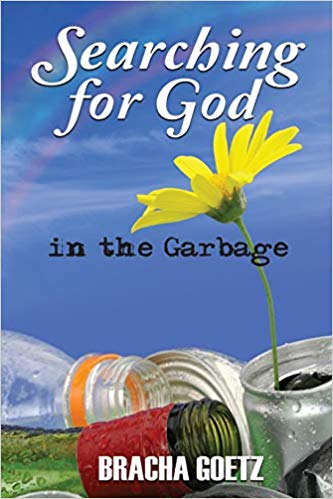
The title of this book is thought-provoking. Can God be found in the garbage? No, he can’t. But maybe if you search hard enough, you might just find God in the garbage. In essence, what the author, Bracha Goetz, is trying to communicate is the agony of searching for happiness in seemingly odd places.
After you’ve been hurt, you may choose to change environments, try to block the memories of the person that hurt you, among other measures that are only short-lived.
But in Searching for God in the Garbage, Goetz stresses the need for patience and persistence in seeking true forgiveness. The author observes that if we diligently pursue the things that help us to forgive easily, we can eventually discover a life filled with love and happiness.
10. Forgiving As We’ve Been Forgiven: Community Practices for Making Peace by L. Gregory Jones and Célestin Musekura
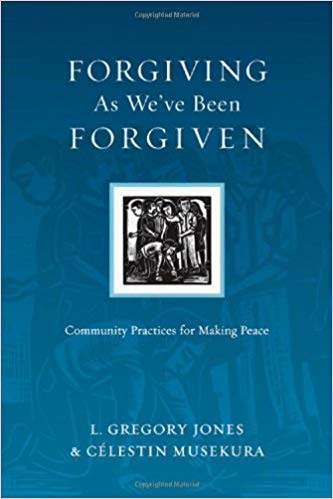
This is another book on forgiveness with a thought-provoking title. Does it mean that we should only forgive when we’re forgiven? Certainly not.
The book appears to make an allusion to the Biblical teachings on forgiveness – that Christ forgave us all our sins even when we didn’t deserve it. So, if God, out of his abundance in grace and mercy, already forgave us our sins despite how vile the human race is, who are we not to forgive our fellow humans.
One of the co-authors of the book, Célestin Musekura, brings in first-hand experiences from the post-genocide Rwanda. Through these experiences, we learn how quickly a country or society can recover from conflicts if we only forgive one another.
Final Word
Forgiveness is one of the noblest expressions of love and kindness. And forgiveness is not for the other party. Therefore, expecting them to own up to their mistakes only prolongs your suffering.
Why not take the initiative today to forgive all those who have deeply hurt you?

